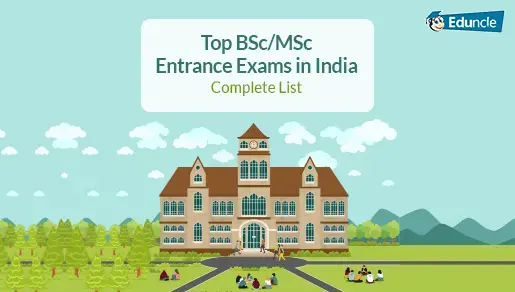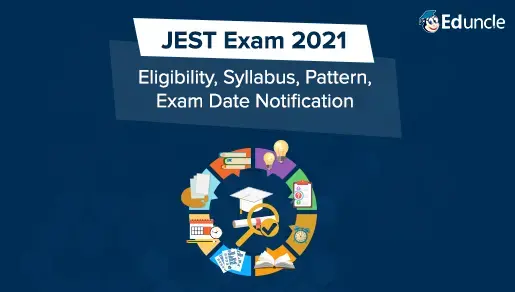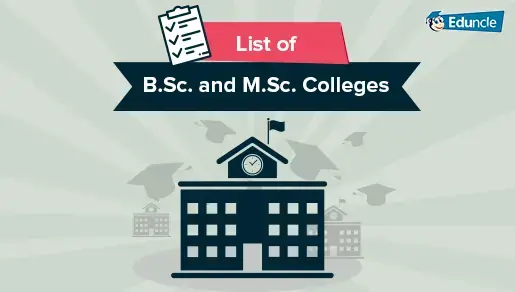
Enrolling in an M.Sc degree program will help you enhance your professional career. After taking an M.Sc degree, you develop both your personal and professional skills. You can either go for a research field or become a scientist.
But before appearing in MSc courses, many questions might strike your mind, such as – “What is the entrance exam for MSc?” or “In what subjects can I get an MSc Degree?” etc.
The variety of questions for MSc courses can be overwhelming. Eduncle provides you answers to all frequently asked questions to have a clear picture for MSc courses.
MSc FAQs – Get Your Queries Resolved!
Ques: What is the meaning of an MSc Degree?
Ans: It is a postgraduate program that can be taken after graduation. MSc is a master’s degree that provides theoretical and practical knowledge in science and medicine. Many universities in India offer this. Some of these universities also provide interdisciplinary MSc courses.
Ques: What is the minimum qualification required to get admission in MSc?
Ans: The eligibility criteria to get admission in MSc courses is: -
Candidates should have a BSc degree from any recognized college or university. Or
BSc with Physics, Chemistry, Mathematics optional. Or
BSc with at least one subject - Biological Sciences, BAMS, MBBS, BHMS, BPT, or B. Pharma
Candidates should have 50% aggregate marks in BSc. Although, this requirement is optional. Only topmost institutes such as IITs, NITs have such minimum percentage requirement.
Note: If you want to pursue MSc from IITs/IISc, know About IIT JAM, for which you must have 55% aggregate marks at BSc level.
Ques: How many years does it take to complete MSc in India?
Ans: Master’s in science is a next-level course after a bachelor’s degree. The duration of an MSc in India depends upon the requirement set by a different program of study. Generally, MSc is 2 years (four semesters) full-time course.
Ques: What is the entrance exam for MSc?
Ans: There are many entrance examinations for MSc courses by which you can get admission in top universities with IITs, IISC, and NITs. Some state-level universities offer direct admission for MSc Courses too. In the table below, we have mentioned the name of the entrance exam with conducting authority.
| Entrance Exam Name |
Conducting Authority |
| AGRICET |
Acharya N G Ranga Agricultural University |
| AIEEA |
Indian Council of Agricultural Research (ICAR) |
| GSAT |
GITAM Institute of Science |
| IGKV CET |
Indira Gandhi Krishi Vishwavidyalaya |
| IIT JAM |
IIT Kharagpur (in 2019) |
| Indian Institute of Science Education and Research, Thiruvananthapuram |
|
| MCAER CET |
Maharashtra Council of Agricultural Education and Research (MCAER), Pune |
| National Entrance Screening Test (NEST) |
National Institute of Science Education and Research (NISER) Bhubaneswar and University of Mumbai |
| OUAT Entrance Exam |
Orissa University of Agriculture and Technology (OUAT) |
| Pant Nagar University Entrance Exam |
GB Pant University of Agriculture & Technology |
| Rajasthan JET |
Maharana Pratap University of Agriculture & Technology (MPUAT), Udaipur |
| TIFR Graduate School Admissions (GS) |
Tata Institute of Fundamental Research |
| UPCATET |
Chandra Shekhar Azad University of Agriculture & Technology |
Ques: In what subjects can you get an M.Sc degree?
Ans: There are more than 300 MSc courses available in India, but Mathematics, Physics, Chemistry, and Biology (Zoology and Botany) are the most famous courses taken by the students. Most of the students are not aware of all MSc courses.
Listed down below are the list of subjects –
MSc in Mathematics
MSc in Chemistry
MSc in Physics
MSc Computer Science
MSc in Geology
MSc in Agriculture
MSc in Economics
Know all MSc courses names with course duration here – List of MSc Courses in India
Ques: What is MSc in Food Technology?
Ans: MSc in food technology is a 2-year postgraduate program that includes the processing, protection, preparation, selection, distribution, storage, and quality condition of food. The program covers the following components of the study: -
Food Microbiology
Food chemistry
Dairy Technology
Microbiology, Nutrition and Food Analysis
Physical, microbiological, and chemical makeup of food
Design and production of foods with health benefits
Packaging Technology
Food Processing
Surface and Colloid Chemistry
Candidates who want to appear in MSc in Food Technology have the option of becoming a food research scientist.
Ques: What are the subjects in MSc Mathematics?
Ans: The most important topics that are included in MSc Mathematics are: -
Graph Theory
Mathematical Modelling
Differential Geometry
Complex Analysis
Real Analysis
Matrix Theory
Functional Analysis
Optimization Techniques
Candidates can get advanced knowledge of all the topics in this course. Also, the syllabus of MSc courses is different for each university.
Ques: What are the subjects in MSc Computer Science?
Ans: MSc Computer Science has been designed to teach a range of advanced topics and the core of fundamental subjects of the computer. It includes theory and programming knowledge. Some important MSc Computer Science subjects are: -
Basic Programming Laboratory
Programming Languages
Theory of Computation
Design and Analysis of Algorithms
Mathematical Logic in Computer Science
Discrete Mathematics
Distributed Systems
Computer Systems Verification
Ques: What is MSc Chemistry?
Ans: Master of Science in Chemistry or MSC Chemistry is a 2-year postgraduate program. This course teaches about chemical products, reactions, and organic chemistry. After completing the MSc in Chemistry, you can go with the research area. You can get a job as Analytical Chemist, Biotechnologist, Chemical Engineer, Healthcare Scientist, Clinical Biochemistry, Forensic Scientist, Nanotechnologist, Pharmacologist, etc.
Ques: Which university is best for MSc Physics? What are the subjects included?
Ans: Physics is a subject of science that offers the study of nature, properties of matter, and energy. The course of MSc Physics includes the topics like: -
Mechanics
Heat
Light and other radiation
Sound
Electricity
Magnetism
Structure of atoms
Many Universities in India offer postgraduate programs in Physics. Students who are seeking admission in MSc Physics can check the list of the best colleges for MSc Physics in India below: -
Indian Institute of Technology, Bombay
Birla Institute of Technology and Sciences, Pilani
Institute of Technology, Banaras Hindu University, Varanasi
Vellore Institute of Technology, Vellore
Indian Institute of Technology, Delhi
Indian Institute of Science, Bangalore
Ques: What kind of job can you get with an MSc Degree?
Ans: After getting an MSc degree, most of the candidates apply for a PhD course or can go for research. Many companies such as ISRO, BARC, and ISI conduct exams for the Scientist posts. If you are pursuing an MSc Degree, you can check career options after MSc.
Ques: Can I join ISRO after my MSc in Physics?
Ans: Yes, you can join ISRO (Indian Space Research Organization) after completing MSc in Physics. You can work as a research associate in various projects of ISRO. ICRB (ISRO Centralized Recruitment Board) releases the various vacancies from time to time.
To join the ISRO, you need to BSc and MSc with 65% marks or 6.5 CGPA on a scale of 10. After that, you can apply for ISRO Entrance Exam. Once you clear the exam, then you can join it.
Ques: What can we do after MSc?
Ans: There are many options after MSc. Here we are sharing some of the best career options for you:-
Become a Research Assistant in Indian laboratories for collecting information from investigations and experiments.
You can become a professor for teaching and guiding the students about the specific courses.
Worked as a Junior Research Fellow after qualifying the exams like CSIR NET. As a research fellow, you can conduct research and perform research-related activities in top research laboratories.
You can be a manager or Executive in various organizations for planning, leading, and managing operations and business.
MSc graduates can also get a job in various government departments like nursing, economics, agriculture, chemistry, zoology, etc.
Ques: Are MSc First-Year Students Eligible for Competitive Exams like CSIR NET?
Ans: Yes, aspirants who enrolled for the master’s degree can apply for CSIR NET Exam under the result awaited (RA) category.
Those students who enrolled for MSc or have completed 10+2+3 years of Integrated BS-MS/BE/B.Tech/B.Pharma, as on the closing date of the online application form, is eligible for CSIR NET. But the condition is the candidate must complete the qualifying degree with the requisite percentage (55% for General & OBC categories) of marks within the validity period of two years to avail of the fellowship.
All such candidates will require to submit the attestation form certified by the Head of Department/Institute from where candidates are appearing or have appeared.
Like CSIR NET, there are also such exams for students to apply like ICMR-JRF, DBT-JRF, etc.
Ques: What is the salary of an MSc Post-Graduate in India?
Ans: The average salary of an MSc Student depends on where they work. If you join multinational companies for a suitable job profile, your starting salary will be 25000-40000 per month in India. You can earn much better or lesser based on your skills and type of job.
Ques: Can I do MSc after BA, BTech, BCA, or any other bachelor’s degree?
Ans: You can’t apply for any MSc entrance exam if you do not have BSc, BTech degree in your graduate program. All the postgraduate entrance exams have different eligibility criteria. If you fulfill the criteria, you can apply for the MSc program.
Ques: Are MS and MSc the same?
Ans: MS and MSc both are Master of Science, but both are different. Candidates who want to pursue an MSc degree should have a BSc degree in any science subject. But the candidates who have a bachelor’s degree in any subject can apply for an MS degree.
MSc degree candidates apply for MS Degree, but It is not same with an MS degree.
Candidates who wish to complete your post-graduation from abroad can pursue an MS program while MSc is India level post-graduation program
There are many other Differences Between MS vs MSc Degree. You can check and choose which you want.
Ques: Can I do MBA after MSc?
Ans: Yes, you can go with MBA after completing an MSc degree. The benefit of pursuing an MBA is: -
Higher salary.
Switching jobs will be easy.
You will directly get management-level posts.
Ques: Can I do MSc Physics after BSc Mathematics?
Ans: Yes, you can do MSc Physics after completing your BSc in Mathematics, but you need some elective subjects of physics. If you fulfill the post-graduation entrance exam criteria, you can do it. IIT JAM provides you a chance to get an MSc degree in top IITs, NITs, and IISc in different subjects.
Ques: Can I get a master’s degree without a bachelor's?
Ans: You can’t apply for a master’s degree if you don’t have a bachelor’s degree. In India, a postgraduate degree requires an undergraduate degree. So first, complete your bachelor’s degree, then apply for an MSc or MS degree.
In this article, we tried to cover up all the questions generally asked by the candidates for MSc courses. If you are interested in studying MSc after graduation and have any queries regarding MSc courses, drop us a comment below.
We hope you found the information mentioned above relevant to you, then kindly share it with your friends.
Thank You!!


















